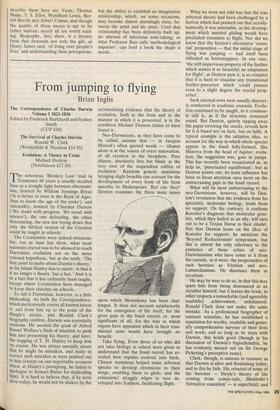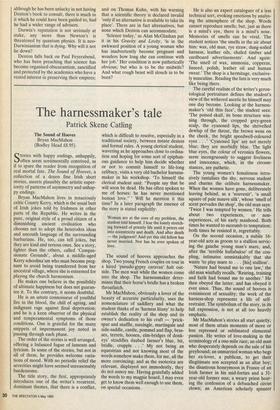From jumping to flying
Brian Inglis
The Correspondence of Charles Darwin Volume I 1821-1836 Edited by Frederick Burkhardt and Sydney Smith (CUP £30)
The Survival of Charles Darwin Ronald W. Clark (Weidenfeld & Nicolson £14.95) Evolution: A Theory in Crisis Michael Denton (Hutchinson £17.50)
The notorious 'Monkey Law' trial in Tennessee 60 years is usually recalled here as a straight fight between obscurant- ism, fronted by William Jennings Bryan (`It is better to trust in the Rock of Ages, than to know the age of the rocks'), and rationality, fronted by Clarence Darrow ('We stand with progress. We stand with science'); the one defending, the other denouncing, the new law laying down that only the biblical version of the Creation could be taught in schools.
The Creationists were indeed obscuran- tist; but as time has show, what most scientists craved was to be allowed to teach Darwinian evolution not as the more rational hypothesis, but as the truth. `The first point to make about Darwin's theory,' as Sir Julian Huxley was to assert, 'is that it is no longer a theory, but a fact.' And it is as a fact that it has ordinarily been taught, except where Creationists have managed to keep their clutches on schools.
To call it Darwinian, however, is a little misleading. As both the Correspondence, Which meticulously covers all known letters to and from him up to the point of the Beagle's return, and Ronald Clark's biography confirm, Darwin was essentially cautious. He needed the goad of Alfred Russel Wallace's flash of intuition to push him into presenting his theory; and later, the nagging of T. H. Huxley to keep him on course. He was always uneasily aware that he might be mistaken, and ready to correct such mistakes as were pointed out to him (except on one regrettable occasion When. at Huxley's prompting, he failed to apologise to Samuel Butler for misleading him). It is hard to believe that, if he were alive today, he would not be shaken by the
accumulating evidence that the theory of evolution, both in the form and in the manner in which it is presented, is in the condition Michael Denton claims to have found it.
Neo-Darwinians, as they have come to be called, assume that — in Jacques Monod's often quoted words — 'chance alone is at the source of every innovation, of all creation in the biosphere. Pure chance, absolutely free but blind, at the very root of the stupendous edifice of evolution.' Random genetic mutations bringing slight benefits can account for the development of every form of life from amoeba to Shakespeare. But can they? Denton examines the three main issues
upon which Monodomy has been chal- lenged. It does not account satisfactorily for the emergence of life itself; for the great gaps in the fossil record; or, most significant of all, for the way in which organs have appeared which in their tran- sitional state would have brought no benefit.
Take flying. Even those of us who did not take biology at school were given to understand that the fossil record has re- vealed how reptiles evolved into birds. Chance mutations helped some arboreal species to develop extensions to their wings, enabling them to glide; and the extensions' straggly edges in turn de- veloped into feathers, facilitating flight. What we were not told was that the true arboreal theory had been challenged by a faction which had pointed out that aerody- namically it was untenable, as the develop- ment which assisted gliding would have precluded transition to flight. Nor did we know that the faction's alternative 'curso- fiat' proposition — that the initial stage of flying was jumping — had itself been ridiculed as bootstrappery. In any case, 'the stiff impervious property of the feather which makes it so beautiful an adaptation for flight', as Denton puts it, is so complex that it is hard to visualise any transitional feather-precursor which 'could possess even to a slight degree the crucial prop- erties'.
Such internal rows were usually discreet- ly conducted in academic journals. Evolu- tion continued to be taught, as it common- ly still is, as if the structure remained sound. But Denton, quietly ripping away the paper covering the cracks, reveals how far it is based not on facts, but on faith. A typical example is the saltation idea, to account for the way in which whole species appear in the fossil fully-formed, like Minerva from the head of Jupiter; evolu- tion, the suggestion was, goes in jumps. This has recently been resuscitated as, so help us, 'punctuated equilibrium'; but as Denton points out, its main influence has been to focus attention once more on the embarrassing gaps in the fossil record.
What will be most embarrassing to the neo-Darwinians, however, will be Den- ton's revelation that the evidence from his speciality, molecular biology, lends them no support. On the contrary, it confirms Koestler's diagnosis that molecular gene- tics, which they hailed as an ally, will turn out to be a Trojan Horse in their citadel. Not that Denton leans on the likes of Koestler for support; he mentions the 'Beyond Reductionism' symposium, but this is almost his only reference to the existence of those critics of neo- Darwinianism who have come at it from the outside, as it were: the propounders of such heresies as Vitalism and neo- Lamarckianism. He dismisses them as occultists.
He may be wise to do so, in that this may spare him from being denounced as an occultist himself; but it leaves the book, in other respects a remarkable (and agreeably readable) achievement, unbalanced.
Ronald Clark does not make the same
mistake. As a professional biographer of eminent scientists, he has established a
reputation for worthy, readable and gener- ally comprehensive surveys of their lives and work; and so long as he stays with Darwin, this holds good (though in his discussion of Darwin's hypochondria, he has evidently missed out on Sir George Pickering's perceptive essay).
Clark, though, is anxious to reassure us that Darwin is alive and flourishing today; and in this he fails. His rebuttal of some of the heresies — Hoyle's theory of life coming from comet-tails, Sheldrake's 'formative causation' — is superficial; and although he has been unlucky in not having Denton's book to consult, there is much in it which he could have been guided to, had he had a wider range of advisers.
Darwin's reputation is not seriously at stake, any more than Newton's is threatened by quantum physics. It is neo- Darwinianism that is dying. Why will it not lie down?
Denton falls back on Paul Feyerabend, who has been preaching that science has become organised obscurantism, sanctified and protected by the academics who have a vested interest in preserving their empires; and on Thomas Kuhn, with his warning that a scientific theory is declared invalid 'only if an alternative is available to take its place'. There are in fact alternatives, but none which Denton can accommodate.
'Science today,' as Alan McGlashan put it in his Gravity and Levity, 'is in the awkward position of a young woman who has inadvertently become pregnant and wonders how long she can continue with her job.' Her condition is now pathetically obvious; but who is to be the midwife? And what rough beast will slouch in to be born?



















































 Previous page
Previous page